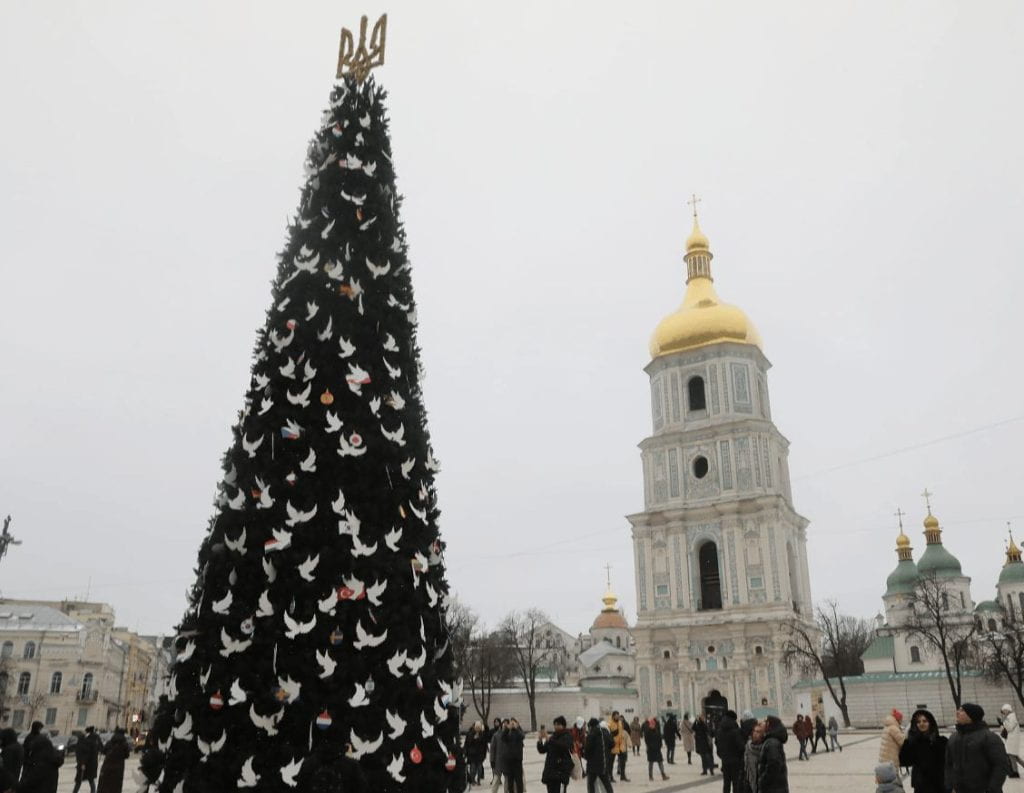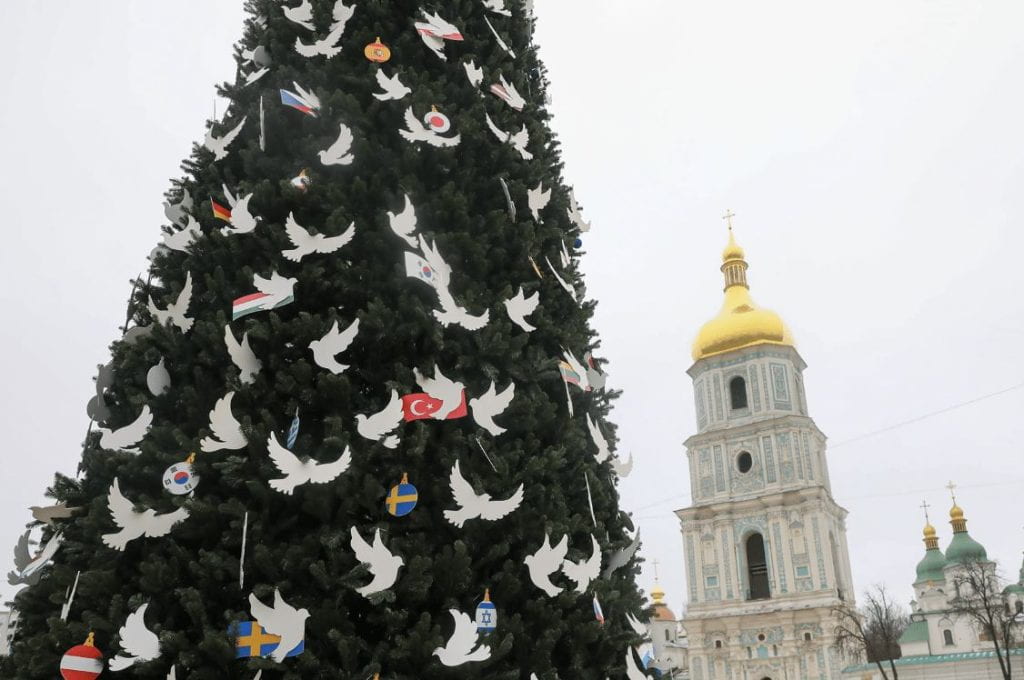With constant bombing and little electricity, upcoming holidays are not so cheery for Ukraine

By Anna Romandash
Ukrainians like to go big on Christmas; in fact, they like it so much that they celebrate it twice. The first official Christmas holiday is on December 25. The second one is January 7. Both celebrations are followed by the twelve traditional meals, caroling, and impressive Christmas markets.
This year, the celebrations will be very different. Due to the ongoing Russian invasion and constant bombings of civilian infrastructure, millions of Ukrainians are left without heating, water, and electricity. In addition, many are struggling financially as they lost their jobs and housing due to the Russian war.
Across Ukraine, people are slowly starting to prepare for the upcoming holidays. In Mykolaiv, a regional center in the South only thirty minutes away from Russia-occupied territories, the city authorities installed a Christmas tree decorated with camouflage nets and military-inspired ornaments. The tree is a reminder of the hardships soldiers and civilians all have to endure.
“It’s tough times, so the holidays will reflect that,” says Eugenia Hlushchenko, a Kharkiv resident. Kharkiv, Ukraine’s second-largest city, is only one hour away from the current frontline in the East. The city is constantly under shelling from the Russian army; bombings and destruction of civilian buildings have become an ordinary occurrence.
“I remember that every year, there would be huge debates on Christmas decorations and how much we’re going to spend on that from the city budget,” Eugenia laughs, “It now feels like it was a different era; it’s so surreal to think that we had such a good life and bothered ourselves with such things.”
In Kharkiv, there won’t be a big Christmas tree in the city main square as in normal times. Instead, the city authorities installed smaller Christmas trees in some bigger bomb shelters and metro stations where people go during air alerts.
“I thought it was a very smart effort, and it was nice to see those Christmas decorations at least somewhere,” Eugenia reflects, “The city is mostly dark as we’re saving electricity, so having Christmas lights is a luxury in this environment.”
For Eugenia, she plans to stay at home for the holidays and spend more time with her family while decorating a little plastic tree and cooking kutya, a traditional Christmas dessert. She has a son of pre-school age who does not go to the kindergarten now because of the war; and her husband works in the bank in the city.
“We spend many nights in the corridor or go to the subway when there is an air alarm,” Eugenia says, “When there is no heating or electricity, I go to subway or train stations to charge my phone and warm myself up. It is very difficult with a little kid.”
For Christmas, Eugenia plans to cook traditional Ukrainian meals; this year, she will also celebrate on December 25 instead of January 7, when most Orthodox Christians observe Christmas.
“For Christmas, I wish for victory and for a peaceful future for my child and for all the children of Ukraine,” she says.
“This holiday season, we’re celebrating our army”
Unlike Kharkiv, Kyiv will have a Christmas tree on the city’s main square although it’s going to be very different from last year. This year the tree will be smaller and with energy-saving lights. There won’t be any Christmas markets or usual festivities on the main square.
“The weather is dreadful; everything is dull and cold,” Yana Lyashuk says. A resident of Kyiv, she wants to travel to Western Ukraine for the holidays to spend time with her partner’s family.
“My boyfriend is originally from Donetsk region; his family home was destroyed,” she says, “Now, his parents are sheltering near the Hungarian border. We stayed with them when the invasion started, but then, returned to Kyiv in summer. Now, we want to go back to see them.”
Yana and her partner live in a very fortunate place in Kyiv; their apartment building is right next to the hospital, so they almost never get electricity cuts as they share the same electricity grid with the medical institution. They also have stable heating and water supply.
“Unless there is a major bombing, we have connection and other utilities,” Yana explains, “So sometimes, I work from home instead of going to the office because there we may not have any electricity.”
Yana rarely goes to the city center now because of the bombing scare; the downtown area is more likely to be targeted, she believes. Yet, she wants to see the Christmas tree once it’s installed.
“We will have a very modest celebration this year, and I think that’s true for most Ukrainians,” she says, “We’re very grateful to be alive, and we will celebrate our army this season because we get to have the holidays only because of them. I won’t be spending money on gifts; I’d rather donate to the Armed Forces.”
“I also want to take a photo in front of the Christmas tree because with or without lights, Kyiv is so beautiful,” Yana adds, “I know that this year’s tree is called The Tree of Unbreakables, and I think it is a very fitting name.”

Holidays are not as cheerful this year
“I kind of forgot that the holidays were coming,” Maryana Oleksiv says. She is from Lviv, the biggest city in Western Ukraine, well-known for its Christmas market and festivities. Normally, Lviv has a big tree, hundreds of thousands of tourists, many carolers on the streets, and various shows and performances across the city.
This year, Lviv will have none of that. The city administration decided that there is no money or energy to spare on any celebrations. Lviv residents sometimes get electricity for only four hours a day, so the residents have to be very resourceful in order not to freeze this winter.
“I bought myself thermal underwear, and that’s the gift I will get my relatives,” Maryana says. Despite the need to work in nearby cafes which have generators, she is hopeful.
“I donated money and bought some thermal underwear for the soldiers, too,” she adds, “And I am excited about the holidays although to be honest, the days are very blurry, so it’s not like I am preparing for any special day or something.”
“I spend part of my time at my boyfriend’s, and the other part at my mom’s, so I commute between places whenever there is electricity,” Maryana continues, “Given that I cannot work as much as before as my job requires steady Internet, that commute fills up the free hours I have.”
Maryana’s family is all in Lviv; they have prepped for the winter by getting many blankets and layering up. Maryana has not yet bought a generator, but she is considering it.
“My boyfriend suggested that if we keep on getting so many blackouts, we’d need to get some generator before the New Year,” she says, “So maybe, that’s going to be an investment we’re going to make in 2023.”
“I’ve never experienced anything like this winter,” Maryana reflects, “And I never thought that my thirtieth Christmas will be during the war in my country.”
“But it made me appreciate what I have more,” she adds, “Many of my friends are in the trenches or have been wounded in battle, so I know it could be much worse.”
Maryana traveled to Paris for work at the end of the fall, and she could not believe her eyes when she saw the abundance and the many lights in the French capital.
“Seeing how dark Lviv is and how we value electricity and simple things made me forget that very close from us, people lead a very different life,” the woman reflects, “I didn’t realize how quickly I adapted to the war reality, and how this survival mode became the new normal for me.”
Anna Romandash is a Ukrainian freelance journalist and 2022 Research Affiliate at the Mgrublian Center for Human Rights at Claremont McKenna College
